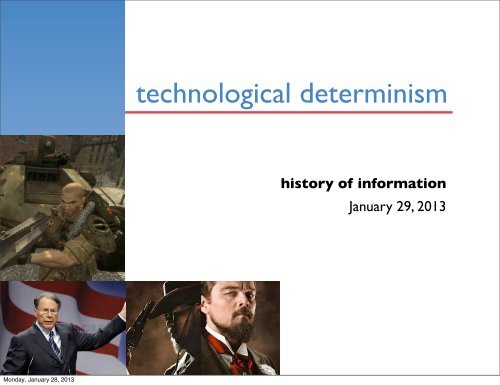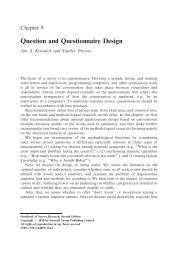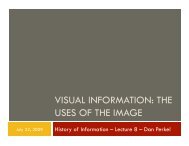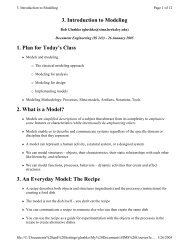technological determinism - Courses
technological determinism - Courses
technological determinism - Courses
You also want an ePaper? Increase the reach of your titles
YUMPU automatically turns print PDFs into web optimized ePapers that Google loves.
<strong>technological</strong> <strong>determinism</strong><br />
history of information<br />
January 29, 2013<br />
Monday, January 28, 2013
waitlist<br />
cog sci, 5; history, 5; info, 4; mediast, 4<br />
admin<br />
signup - we will start clearing list at the end of this<br />
week looking at attendance, assignments, Bancroft tour<br />
Bancroft tour 2/5, 2/6, 2/7<br />
sign up<br />
https://docs.google.com/spreadsheet/ccc?<br />
key=0Ask5QVp5ON4SdGQ5dDhPRk9kUTRuLW1GS0lVZDk0SUE#gid=0<br />
slides<br />
http://courses.ischool.berkeley.edu/i103/s12/SLIDES/3-HofI13-<strong>determinism</strong>-PD.pdf<br />
3-HofI13-<strong>determinism</strong><br />
2<br />
Monday, January 28, 2013
admin<br />
discussion<br />
assignments<br />
submission --<br />
argument, not summary: ATQ<br />
cite, proofread<br />
"the effects of the median"<br />
"Richard Williams correctly critiques"<br />
"unreasonable that there could be no causalities at all. And to"<br />
3-HofI13-<strong>determinism</strong><br />
3<br />
Monday, January 28, 2013
admin<br />
above all -- be nice to Bryan<br />
pasting into bSpace preferable<br />
if using attachment, put your name on it<br />
3-HofI13-<strong>determinism</strong><br />
4<br />
Monday, January 28, 2013
overview<br />
determined mistakes<br />
wishing<br />
attractions<br />
taking sides<br />
how to think<br />
about tech<br />
<strong>determinism</strong><br />
3-HofI13-<strong>determinism</strong><br />
5<br />
Monday, January 28, 2013
cover story<br />
technology's effects<br />
"[Sarnoff] Firearms are in themselves neither<br />
good nor bad, its the way they are used"<br />
"Often said ... television has altered our<br />
world ... sex and violence, political<br />
manipulation, cultural degradation."<br />
3-HofI13-<strong>determinism</strong><br />
6<br />
Monday, January 28, 2013
which side are you on?<br />
"a callous, corrupt and corrupting shadow<br />
industry that sells, and sows, violence<br />
against its own people... Bulletstorm, Grand<br />
Theft Auto, Mortal Kombat and Splatterhouse.<br />
And here’s one: it’s called Kindergarten<br />
Killers. ... Then there’s the blood-soaked<br />
slasher films like “American Psycho” and<br />
“Natural Born Killers”<br />
NRA News Conference, Dec 21, 2012<br />
3-HofI13-<strong>determinism</strong><br />
7<br />
Monday, January 28, 2013
McLuhan - 1964<br />
Marshall McLuhan<br />
1911-1980<br />
"very large structural changes in human outlook ...<br />
"totally new environment ...<br />
"the new electric Age of Information ...<br />
"Each new technology creates an environment ...<br />
"abolishing both space and time ...<br />
"final phase of the extensions of man...<br />
a single consciousness ...<br />
"Global Village"<br />
3-HofI13-<strong>determinism</strong><br />
8<br />
Monday, January 28, 2013
without resistance<br />
<strong>determinism</strong> at its clearest<br />
"The railway ... created totally new kinds of city ...... This<br />
happened whether the railway functioned in a tropical or a northern<br />
environment, and is quite independent of freight or content.<br />
"The spiritual and cultural reservations that the oriental peoples<br />
may have toward our technology will avail them not at all. The<br />
effects of technology do not occur at the level of opinions or<br />
concepts, but alter sense ratios or patterns of perception steadily<br />
and without any resistance."<br />
Monday, January 28, 2013<br />
3-HofI13-<strong>determinism</strong><br />
9
antecedents<br />
"Science explores,<br />
Technology executes,<br />
Man conforms"<br />
Chicago World's Fair, 1933<br />
3-HofI13-<strong>determinism</strong> 10<br />
Monday, January 28, 2013
modern versions<br />
"When technology shifts, it bends the culture"<br />
-- Kevin Kelly,<br />
"Becoming Screen Literate,"<br />
New York Times 2008<br />
3-HofI13-<strong>determinism</strong> 11<br />
Monday, January 28, 2013
Williams - 1973<br />
Raymond Williams<br />
1921-1988<br />
coming up:<br />
telegraph ...<br />
photograph ...<br />
moving image ...<br />
broadcast ...<br />
the invention of television<br />
"The invention of television was no single<br />
event ... electricity ... telegraphy ...<br />
photography... moving images ... radio ...<br />
broadcast ...<br />
"centralisation of political power<br />
"mobile, diffused society ...<br />
"military, commerce, the press ...<br />
"periods of crisis ..."<br />
3-HofI13-<strong>determinism</strong> 12<br />
Monday, January 28, 2013
what's wrong with <strong>determinism</strong>?<br />
Williams<br />
"ratifies the society and culture we have<br />
now .... all other causes, all that men<br />
ordinarily see as history, are at once reduced to<br />
effects ....<br />
"what are elsewhere seen as effects ... excluded<br />
as irrelevant<br />
"welcomed by the 'media-men' ...<br />
"gives the gloss of avant-garde theory to ...<br />
existing interests."<br />
3-HofI13-<strong>determinism</strong> 13<br />
Monday, January 28, 2013
not determining, not<br />
symptomatic<br />
"technology is not marginal but central"<br />
"restore intention to the process of research and<br />
development<br />
... the technology something looked<br />
Fernand Braudel<br />
1902-1985<br />
for."<br />
---------------<br />
"The history of technology is that of humanity<br />
in all its diversity. That is why specialist<br />
historians of technology hardly ever manage to<br />
grasp it entirely in their hands'.<br />
--Fernand Braudel, Structures of Everyday Life,<br />
3-HofI13-<strong>determinism</strong><br />
1967<br />
14<br />
Monday, January 28, 2013
overview<br />
determined mistakes<br />
wishing<br />
attractions of TD<br />
taking sides<br />
how to think<br />
about tech<br />
<strong>determinism</strong><br />
3-HofI13-<strong>determinism</strong><br />
15<br />
Monday, January 28, 2013
taking sides<br />
McLuhan -- the medium does it -- 40%<br />
Williams -- no it's not -- 45%<br />
maybe; maybe not: -- 15%<br />
3-HofI13-<strong>determinism</strong> 16<br />
Monday, January 28, 2013
neither / nor<br />
Zachary Hsi: McLuhan is spot on in measuring human progress by the<br />
technologies of the time, but Williams correctly discerns the human<br />
influence that also plays a part.<br />
Diana Ognesyan: I side more with McLuhan but see some of the points that<br />
Williams makes. So in some small scale, we also control the medium as it<br />
is an extension of ourselves.<br />
Avi Press: If my studies in cognitive science have taught me anything, it is<br />
that if there are two rival theories that each have strong evidence in<br />
favor, the truth is likely elements of both.<br />
Sean Trott: Thus, we conclude that, while technology certainly plays a<br />
causal role in social development, that same technology is itself the<br />
effect of previous social environments.<br />
3-HofI13-<strong>determinism</strong> 17<br />
Monday, January 28, 2013
neither / nor<br />
Joseph Schadlick: Technological and social progression seem more<br />
intertwined than either thinker argues, as social changes bring<br />
technology which alter social perception and pave the way for future<br />
<strong>technological</strong> and social progression.<br />
Steven Rivera [citing Fisher, SCOT]: Williams, in some sense of the word,<br />
is more right than McLuhan, but McLuhan’s idea that “it is the medium<br />
that shapes and controls the scale and form of human association and<br />
action” is also valid ... a medium’s message also includes the intent<br />
as described by Raymond Williams, which includes both content and<br />
effect<br />
Monday, January 28, 2013<br />
3-HofI13-<strong>determinism</strong> 18
for McLuhan<br />
Kenneth Patterson: I think McLuhan’s analysis is a more accurate account of the way<br />
by which technology is influencing our society. His example that the light bulb has<br />
created a completely new human environment is not only precise but clearly<br />
demonstrates the scope by which technology can effect our society.<br />
Warren McQuinn: McLuhan points to the gradual creation of a new “human<br />
environment” [vi], as opposed to development upon existing human environments,<br />
as fair explanation for his hope that <strong>technological</strong> development, or, the<br />
creation of new media to disseminate and include, will eventually lead to a<br />
singularity in which all residents who participate in the “human environment”<br />
are equally able to fulfill historical deeds or desires. At least, this is the<br />
goal that can be extrapolated from his commitment to the “final phase of man--<br />
the <strong>technological</strong> simulation of consciousness” [3] which he cannot denote as<br />
good nor bad -- but simply by admitting its finality he intends that all<br />
questions will indeed be answered, and are therefore unmasked.<br />
3-HofI13-<strong>determinism</strong> 19<br />
Monday, January 28, 2013
for McLuhan<br />
Melanie Cebula: Although unresolved issues remain independently of which<br />
<strong>technological</strong> age it is, the effects of new technology really can be something<br />
fundamentally new. As Mcluhan states, if you live and participate in a society<br />
with certain technology, the effects of that technology are deeply rooted and<br />
impressed upon those who make up that society.<br />
Jeremy Chang: McLuhan argues very convincingly that technology has definite<br />
influences in the ways we think and act, as technology “alters sense ratios or<br />
patterns of perception” [18] when introduced into society. Regardless of what<br />
type of change society may have been seeking when the television was inventing,<br />
the “implosion” (3) of the past, present, and future information and time period<br />
that television brings to the present is definitely something that has not been<br />
experienced before and will have very real effects. Studying what does and does<br />
not change in society because of the introduction of television into society is<br />
essential.<br />
3-HofI13-<strong>determinism</strong> 20<br />
Monday, January 28, 2013
for Williams<br />
Kathryn Bender: Whereas McLuhan says that the “money medium” in seventeenth-century<br />
Japan “had effects not unlike the operation of typography in the West,” (18), Williams<br />
would have analyzed the implementation of currency into Japanese culture differently;<br />
rather than looking at people as “abstract human nature which has psychic needs and<br />
which variable forms of technology… come to satisfy,” (129), Williams believes<br />
<strong>determinism</strong> is a social process in which factors such as “the distribution of power or<br />
of capital, social and physical inheritance, relations o scale and size between groups<br />
– set limits and control pressures [toward developing and implementing new<br />
technologies] but neither wholly control nor wholly predict the outcome” of the<br />
technologies (130).<br />
Megna Dholakia: I disagree that technology adoption should always be seen as<br />
“inevitable”, that once developed its influence on society is impossible to stop.<br />
Adoption is dependent on the currently recognized needs. Without the city, there would<br />
be no need for the subway. I do not disagree that technology adoption has huge effects<br />
on societal structure, but I do believe that McLuhan’s theory oversimplifies the<br />
complicated interplay between <strong>technological</strong> development, adoption, and the current<br />
needs of a society brought about by political and social changes already in motion.<br />
3-HofI13-<strong>determinism</strong> 21<br />
Monday, January 28, 2013
for Williams<br />
Forrest Riege: Williams also fairly acknowledges the active role technology does play in<br />
societal development, as more than just a by-product of an independent social progression<br />
(“symptomatic technology”): It is human intent that prompts innovators to actively seek<br />
out and develop technologies that address prospective societal needs ... There is not,<br />
however, any single, self-contained force that pushes societal progression, as McLuhan<br />
would lead readers to believe.<br />
Devan Lai: McLuhan’s arguments in favor of <strong>technological</strong> <strong>determinism</strong> are ... ultimately<br />
self-contradictory. While he paints the majority of mankind as being equally oblivious to<br />
new technology (McLuhan 16), he draws upon Tocqueville to argue that the absence of true<br />
revolution in England is due to Parliament’s resistance to the power of the new printed<br />
word (McLuhan 15). Whereas modern man and the Bedouin are both unable to fully comprehend<br />
the new electric world around them, McLuhan attempts to argue that English aristocrats<br />
are far more talented than their French counterparts in denying the transformative power<br />
of print media.<br />
3-HofI13-<strong>determinism</strong> 22<br />
Monday, January 28, 2013
overview<br />
determined mistakes<br />
wishing<br />
attractions of TD<br />
taking sides<br />
how to think<br />
about tech<br />
<strong>determinism</strong><br />
3-HofI13-<strong>determinism</strong><br />
23<br />
Monday, January 28, 2013
easy work<br />
looking back<br />
just look at Cleopatra's nose<br />
3-HofI13-<strong>determinism</strong> 24<br />
Monday, January 28, 2013
coming up: print revolution, Feb 7<br />
easy history?<br />
"Printing, gunpowder and the compass ... whence<br />
have followed innumerable changes, in so much that<br />
Francis Bacon<br />
1561-1626<br />
no empire, no sect, no star seems to have exerted<br />
greater power and influence in human affairs than<br />
these mechanical discoveries."<br />
-- Francis Bacon, Novum Organum, 1620<br />
"He who first shortened the labor of copyists by<br />
device of movable types was disbanding hired<br />
armies, and cashiering most kings and senates, and<br />
creating a whole new democratic world: he had<br />
Thomas Carlyle<br />
1795-1881<br />
invented the art of printing."<br />
--Thomas Carlyle, Sartor 3-HofI13-<strong>determinism</strong> Resartus, 25 1833<br />
Monday, January 28, 2013
looking at ourselves<br />
the inevitable product of progress<br />
"Westward the course of empire takes its way"<br />
John Gast<br />
"American Progress"<br />
1872<br />
3-HofI13-<strong>determinism</strong> 26<br />
Monday, January 28, 2013
easy futurism<br />
looking forward<br />
"these technologies are inevitable ...<br />
Inevitability is not a flaw.<br />
it ... makes predictions easier."<br />
--Kevin Kelly,<br />
What Technology Wants, 2010<br />
3-HofI13-<strong>determinism</strong> 27<br />
Monday, January 28, 2013
looking ahead<br />
supersession<br />
"ceci [the book] tuera cela [the church]."<br />
-- Victor Hugo, Notre-Dame de Paris, 1831<br />
"le journal [newspaper] tue le livre, comme<br />
le livre a tué l'architecture."<br />
-- Théophile Gautier, Mademoiselle Maupin,<br />
1834<br />
"Ceci tuera cela, le fer [les Halles] tuera<br />
la pierre [St. Eustache]."<br />
--Emile Zola, Le Ventre de Paris, 1874<br />
3-HofI13-<strong>determinism</strong> 28<br />
Monday, January 28, 2013
overview<br />
determined mistakes<br />
wishing<br />
attractions of TD<br />
taking sides<br />
how to think<br />
about tech<br />
<strong>determinism</strong><br />
3-HofI13-<strong>determinism</strong><br />
29<br />
Monday, January 28, 2013
"communication<br />
might be<br />
considered<br />
instantaneous."<br />
electrical sublime<br />
"Electric circuitry has overthrown the regime of<br />
'time' and 'space' and pours upon us instantly<br />
and continuously concerns of all other men. It<br />
has reconstituted dialogue on a global scale.<br />
Its message is Total Change, ending psychic,<br />
social, economic, and political parochialism.<br />
Marshall McLuhan<br />
1911-1980<br />
. . . Ours is a brand-new world of allatonceness.<br />
'Time' has ceased, 'space' has vanished. We now<br />
live in a global village . . . a simultaneous<br />
happening."<br />
-- Marshall Mcluhan et al.,<br />
Medium is the Massage, 1967<br />
3-HofI13-<strong>determinism</strong> 30<br />
Monday, January 28, 2013
it makes a village<br />
"abolishing both space and time ...<br />
eliminate time and space factors in human<br />
association .. creating involvement in<br />
depth."<br />
Marshall McLuhan<br />
3-HofI13-<strong>determinism</strong> 31<br />
Monday, January 28, 2013
wishful thinking?<br />
"Ye Gods, annihilate but space and time,<br />
And make two lovers happy."<br />
Swift, Pope, Arbuthnot, 1728<br />
"... no stock phrase in the entire lexicon<br />
of progress appears more often."<br />
--Leo Marx, The Machine in the Garden,<br />
1964<br />
3-HofI13-<strong>determinism</strong> 32<br />
Monday, January 28, 2013
getting together<br />
"Parvenu à la suite de travaux longs et<br />
pénibles à trouver, enfin, un art nouveau<br />
regardé comme impossible par beaucoup des<br />
Savans, une route nouvelle va fournir devant<br />
les efforts de l'homme, les distances vont<br />
disparaître et les extremités du Monde se<br />
rapprocher."<br />
Brevet d'Invention, 1791<br />
3-HofI13-<strong>determinism</strong> 33<br />
Monday, January 28, 2013
getting together<br />
"Parvenu à la suite de travaux longs et<br />
pénibles à trouver, enfin, un art nouveau<br />
regardé comme impossible par beaucoup des<br />
Savans, une route nouvelle va fournir devant<br />
les efforts de l'homme, les distances vont<br />
disparaître et les extremités du Monde se<br />
rapprocher."<br />
Brevet d'Invention, 1791<br />
3-HofI13-<strong>determinism</strong> 33<br />
Monday, January 28, 2013
wishing up a grand future<br />
what and when?<br />
"at bottom, this invention might suffice<br />
to make possible the establishment of<br />
democracy among a large population ... no<br />
reason why it would not be possible for<br />
all the citizens of France to communicate<br />
their will ... in such a way that this<br />
communication might be considered<br />
instantaneous."<br />
-- Alexandre Vandermond, 1795<br />
3-HofI13-<strong>determinism</strong> 34<br />
Monday, January 28, 2013
60 years on<br />
"A line of telegraph ... from London to<br />
Kurrachee, and from thence to every part of<br />
India, ... intelligence and commands [can] be<br />
daily and hourly communicated with the speed of<br />
lightening ... in this virtual annihilation of<br />
time and space in the communications between<br />
England and her distant possessions will be more<br />
than realised"<br />
--Blackwood's Edinburgh Magazine, 1857<br />
3-HofI13-<strong>determinism</strong> 35<br />
Monday, January 28, 2013
sea to shining sea<br />
and tech to shining tech<br />
"the almost complete annihilation of time<br />
and space between the distant antipodal<br />
points of the American continent ...<br />
produced by the construction of the Pacific<br />
Railroad"<br />
-- John Wesley Clampitt,<br />
Echoes from the Rocky Mountains, 1888<br />
3-HofI13-<strong>determinism</strong> 36<br />
Monday, January 28, 2013
moving on<br />
too cheap to meter?<br />
"nuclear domestic power packs leading to a<br />
social revolution in our own time, a society<br />
without class, privilege, cities, nations or<br />
geographical boundaries ... a single, uniformly<br />
spread community, sharing as neighbors the<br />
whole surface of the earth."<br />
-- R.M. Langer, 1940.<br />
3-HofI13-<strong>determinism</strong> 37<br />
Monday, January 28, 2013
shrinking search<br />
"While others cashed in by floating<br />
prematurely on the stock market, they<br />
kept a low profile and built something<br />
profound: a complex, accurate,<br />
essentially democratic search engine<br />
which helped shrink the world as<br />
dramatically as had the compass, the<br />
telegraph and the aeroplane."<br />
Guardian, August 13, 2012<br />
3-HofI13-<strong>determinism</strong> 38<br />
Monday, January 28, 2013
and facebook?<br />
"only the dead have seen the end of war"<br />
George Santayana, Soliloquies in England,<br />
1922<br />
3-HofI13-<strong>determinism</strong> 39<br />
Monday, January 28, 2013
more wishing<br />
you should be so lucky<br />
"Children in the public schools will be<br />
taught practically everything by moving<br />
pictures. Certainly they will never be<br />
obliged to read history again."<br />
-- D.W. Griffith, 1915<br />
3-HofI13-<strong>determinism</strong> 40<br />
Monday, January 28, 2013
educational promises<br />
"One can predict that in a few more years,<br />
millions of schoolchildren will have the<br />
personal services of a tutor as<br />
well-informed as Aristotle."<br />
--Patrick Suppes,<br />
Scientific American, 1966<br />
not Aristotle, but Plato (Programmed Language for<br />
Automated Teaching<br />
Operations),<br />
3-HofI13-<strong>determinism</strong> 41<br />
Monday, January 28, 2013
coming up: social implications<br />
IBM's promise<br />
3-HofI13-<strong>determinism</strong> 42<br />
Monday, January 28, 2013
heard this before?<br />
"[A]s books are now multiplied, and men<br />
able to afford instruction dispersed all<br />
over the kingdom, it is evident that the<br />
principal cause of establishing<br />
universities in an age when both books and<br />
instructors were scarce, no longer<br />
subsists. Let them therefore be reformed,<br />
and rendered really useful to the<br />
community, or let them be deserted.<br />
Vicesimus Knox, Liberal Education, 1781<br />
3-HofI13-<strong>determinism</strong> 43<br />
Monday, January 28, 2013
overview<br />
determined mistakes<br />
wishing<br />
attractions of TD<br />
taking sides<br />
how to think<br />
about tech<br />
<strong>determinism</strong><br />
3-HofI13-<strong>determinism</strong><br />
44<br />
Monday, January 28, 2013
trivializing the past<br />
coming up:<br />
manuscript culture<br />
3-HofI13-<strong>determinism</strong> 45<br />
Monday, January 28, 2013
"Ceci tuera ..."<br />
bad predictions<br />
searching for<br />
the last ... ?<br />
New York Times<br />
1938<br />
3-HofI13-<strong>determinism</strong> 46<br />
Monday, January 28, 2013
constraint vs resource<br />
coming up: newspaper, telegraph<br />
3-HofI13-<strong>determinism</strong> 47<br />
Monday, January 28, 2013
category mistakes<br />
3-HofI13-<strong>determinism</strong> 48<br />
Monday, January 28, 2013
necessary or sufficient?<br />
3-HofI13-<strong>determinism</strong> 49<br />
Monday, January 28, 2013
acking the wrong horse<br />
3-HofI13-<strong>determinism</strong> 50<br />
Monday, January 28, 2013
leaving it all to the horse<br />
3-HofI13-<strong>determinism</strong> 51<br />
Monday, January 28, 2013
"Westward the<br />
course of<br />
empire ..."<br />
techno-superiority<br />
"And for the rest, those swarms of black, and<br />
brown, and dirty-white, and yellow people, who<br />
do not come into the new needs of efficiency?<br />
Well, the world is not a charitable<br />
institution, and I take it they will have to<br />
go. The whole tenor and meaning of the world,<br />
as I see it, is that they have to go."<br />
-- H.G. Wells, Anticipations, 1901<br />
H.G. Wells<br />
1866-1946<br />
3-HofI13-<strong>determinism</strong> 52<br />
Monday, January 28, 2013
linear thinking<br />
unintended consequences<br />
Edward Tenner,<br />
Why Things Bite Back: Technology and the Revenge of<br />
Unintended Consequences, 1997<br />
moral hazard<br />
3-HofI13-<strong>determinism</strong> 53<br />
Monday, January 28, 2013
in conclusion<br />
how to think about <strong>determinism</strong><br />
what happened?<br />
what was involved?<br />
what did (or did not) come before?<br />
what did (or did not) follow?<br />
what did (or did not) contribute?<br />
what happened elsewhere?<br />
what's likely to be underestimated?<br />
what was necessary, what sufficient?<br />
3-HofI13-<strong>determinism</strong> 54<br />
Monday, January 28, 2013
coming up<br />
3-HofI13-<strong>determinism</strong> 55<br />
Monday, January 28, 2013
















